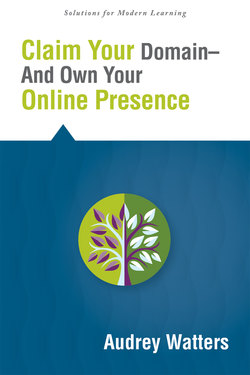Читать книгу Claim Your Domain--And Own Your Online Presence - Audrey Watters - Страница 7
На сайте Литреса книга снята с продажи.
ОглавлениеPreface
By Will Richardson
In the 1960s and 1970s, Penguin published a series of what it called education specials, short books from a variety of authors such as Neil Postman, Ivan Illich, Herb Kohl, Paulo Freire, Jonathan Kozol, and others. All told, there were more than a dozen works, and they were primarily edgy, provocative essays meant to articulate an acute dissatisfaction with the function of schools at the time. The titles reflected that and included books such as The Underachieving School, Compulsory Mis-Education and the Community of Scholars, Teaching as a Subversive Activity, Deschooling Society, and School Is Dead, to name a few. Obviously, the messages of these books were not subtle.
Progressive by nature, the authors generally saw their schools as unequal, undemocratic, and controlling places of conformity and indoctrination. They argued, mostly to nonlistening ears, that traditional school narratives were leaving their learners disengaged and lacking in creativity and curiosity, and the systems and structures of schools were deepening instead of ameliorating the inequities in society. A number of the authors argued that universal schooling was a pipe dream from both economic and political perspectives, and schools, if they were to remain, needed to be rethought from the ground up.
Reading many of these works now, it’s hard not to be struck by how precisely they describe many of the realities of today’s world. It’s inarguable that an education in the United States (and elsewhere) remains vastly unequal among socioeconomic groups and various races and ethnicities. The systems that drove schools years ago prevail and, in many cases, are less and less economically viable by the day. By and large, education is something still organized, controlled, and delivered by the institution; very little agency or autonomy is afforded to the learner over his or her own learning. Decades of reform efforts guided principally by politicians and business-people have failed to enact the types of widespread changes that those Penguin authors and many others felt were needed for schools to serve every learner equally and adequately in preparing him or her for the world that lies ahead.
It’s the “world that lies ahead” that is the focus of this book, part of the Solutions for Modern Learning series. Let us say up front that we in no way assume that these books will match the intellectual heft of those writers in the Penguin series (though we hope to come close). However, we aspire to reignite or perhaps even start some important conversations about change in schools, given the continuing longstanding challenges from decades past as well as the modern contexts of a highly networked, technology-packed, fast-changing world whose future looks less predictable by the minute.
Changes in technology since the early 1990s, and specifically, the Internet, have had an enormous impact on how we communicate, create, and most importantly, learn. Nowhere have those effects been felt more acutely than with our learners, most of whom have never known a world without the Internet. In almost all areas of life, in almost every institution and society, the effects of ubiquitously connected technologies we now carry with us in our backpacks and back pockets have been profound, creating amazing opportunities and complex challenges, both of which have been hard to foresee. In no uncertain terms, the world has changed and continues to change quickly and drastically.
Yet, education has remained fairly steadfast, pushing potentially transformative learning devices and programs to the edges, never allowing them to penetrate to the core of learning in schools. Learning in schools looks, sounds, and feels pretty much like it did in the 1970s, if not in the early 1900s.
Here’s the problem: increasingly, for those who have the benefit of technology devices and access to the Internet, learning outside of school is more profound, relevant, and long lasting than learning inside the classroom. Connected learners of all ages have agency and autonomy that are stripped from them as they enter school. In a learning context, this is no longer the world that schools were built for, and in that light, it’s a pretty good bet that a fundamental redefinition of school is imminent.
While some would like to see schools done away with completely, we believe schools can play a crucially important role in the lives of our youth, the fabric of our communities, and the functioning of our nations. But moving forward, we believe schools can only play these roles if we fully understand and embrace the new contexts that the modern world offers for learning and education. This is not just about equal access to technology and the Internet, although that’s a good start. This is about seeing our purpose and our practice through a different lens that understands the new literacies, skills, and dispositions that students need to flourish in a networked world. Our hope is that the books in the Solutions for Modern Learning series make that lens clearer and more widespread.
